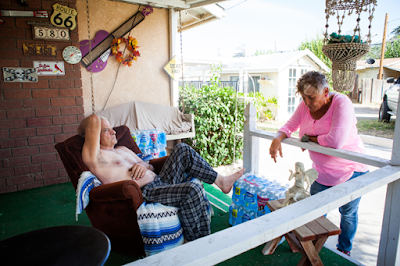 |
| Reuben Perez fills up a barrel of water at the public tank to bring to Juana Garcia's home. The water will be used to do laundry, take bucket showers, and flush the toilet. Gabrielle Lurie |
Thanks to the drought, many people in East Porterville can't cook, shower, or flush the toilet at home.
—By Julia Lurie
Mother Jones
Glance at a lawn in East Porterville, California, and you'll instantly know something about the people who live in the house attached to it.
If a lawn is green, the home has running water. If it's brown, or if the yard contains plastic water tanks or crates of bottled water, then the well has gone dry.
Residents of these homes rely on deliveries of bottled water, or perhaps a hose connected to a working well of a friendly neighbor. They take "showers" with water from a bucket, use paper plates to avoid washing dishes, eat sandwiches instead of spaghetti so there's no need to boil water, and collect water used for cooking and showers to pour in the toilet or on the trees outside.
East Porterville is in Tulare County, a region in the middle of California's agriculture-heavy Central Valley that's been especially hard hit by the state's historic drought. More than 7,000 people in the the county lack running water; three quarters of them live in East Porterville. The community doesn't have a public water system; instead, residents rely on private wells. But after years of drought, the nearby Tule River has diminished to a trickle and the underground water table has sunk as more and more farmers rely on groundwater. Last week, I spent a few days interviewing residents in the town, also known as "ground zero" of the drought.
 |
| Juana Garcia washes grapes with bottled water. She soaks dirty dishes in soapy water before rinsing them to minimize water use. Gabrielle Lurie |
Among the first to report a dry well was Donna Johnson, a 72-year-old retired recreational therapist who lives in East Porterville with her husband, Howard, and a handful of rescue dogs. In the spring of 2014, she turned on the tap to find that it had reduced to a dribble—then no water at all. Howard tried to extend the pump further into the well, but where there should have been a splash of water, there was simply a "thud" of solid against solid. When Johnson called a well-driller and learned the company had a long waiting list, she started wondering just how many wells had gone dry. After a couple of weeks of knocking on the doors of strangers in her neighborhood, Johnson had a list of more than 100 homes.
Over the past 18 months, Johnson has become known as East Porterville's "water lady," as she spends her days collecting donations of water and paper goods and delivering them in a pickup truck to a list of homes with dry wells—a list that's expanded to hundreds of addresses. "There's always somebody calling, saying, 'I don't have water!'" she said.
 |
| East Porterville is in Tulare County |
The county, in part prompted by Johnson's discovery, has also stepped in. Locals can now bathe in portable showers outside the Drought Resource Center (a trailer set up in a church parking lot) and sign up for bottled-water deliveries (half gallon per person per day). Tanks of nonpotable water sit outside the fire station; in the evenings, residents fill up barrels for things like laundry and bathing.
East Porterville residents without running water have fallen into a tedious routine. Juana Garcia, a 49-year-old mother of five, lost water two years ago—in some ways, her living conditions remind her of those she left behind in Mexico when she moved to East Porterville in 1988. The change has been particularly challenging because she suffers from Lupus and arthritis, making it difficult to haul water to her home or make the trek to the public showers.
Garcia doesn't speak much English, so her daughter, a talkative 11-year-old named Noemi, walked me through the daily routine. Dishes are washed in two buckets: one for soaking, the other for rinsing. Afterward, water is dumped into the toilet so it will flush. For showers, Garcia boils water that Johnson hauled in from the gas station (Garcia doesn't have a car), or she takes her kids to the portable shower in front of the church. Teeth are brushed with bottled water; clothes are hand washed and air-dried unless a friend has time to take the family to the laundromat.
The trees in the backyard used to yield pears, lemons, and pomegranates, but they're all dead now; any extra water is used to fuel the swamp cooler, which, Noemi explained, uses five gallons of water an hour—and it's a necessity as temperatures routinely top 100 degrees. For dinner, Garcia makes things that require minimal water and won't heat up the house—like microwave meals or sandwiches.
As an interim solution, the county is installing large plastic tanks of water connected to some dry homes. But progress has been slow. So far, 320 tanks have been installed; more than 1,300 still remain dry.
Read the Full Article . . . .  |
| A map of East Porterville at the county's drought resource center shows homes without running water (green) and homes where large tanks have been installed as an interim solution (blue). Julia Lurie |
 |
| Donna Johnson drops off water for Bill Dennis, whose well went dry last month. Gabrielle Lurie |

No comments:
Post a Comment